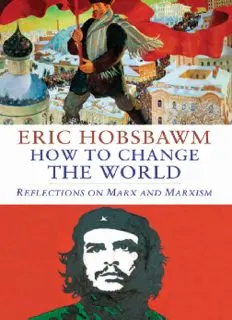
How to change the world : reflections on Marx and Marxism PDF
Preview How to change the world : reflections on Marx and Marxism
How to Change the World Also by Eric Hobsbawm The Age of Revolution 1789–1848 The Age of Capital 1848–1875 The Age of Empire 1875–1914 The Age of Extremes 1914–1991 Labouring Men Industry and Empire Bandits Revolutionaries Worlds of Labour Nations and Nationalism Since 1780 On History Uncommon People The New Century Globalisation, Democracy and Terrorism Interesting Times How to Change the World Reflections on Marx and Marxism Eric Hobsbawm New Haven & London To the memory of George Lichtheim This collection first published 2011 in the United States by Yale University Press and in Great Britain by Little, Brown. Copyright © 2011 by Eric Hobsbawm. All rights reserved. This book may not be reproduced, in whole or in part, including illustrations, in any form (beyond that copying permitted by Sections 107 and 108 of the U.S. Copyright Law and except by reviewers for the public press), without written permission from the publishers. Yale University Press books may be purchased in quantity for educational, business, or promotional use. For information, please e-mail [email protected] (U.S. office) or [email protected] (U.K. office). Typeset in Baskerville by M Rules. Printed in the United States of America. Library of Congress Control Number: 2011927314 ISBN 978-0-300-17616-2 (hardcover : alk. paper) A catalogue record for this book is available from the British Library. This paper meets the requirements of ANSI/NISO Z39.48-1992 (Permanence of Paper). 10 9 8 7 6 5 4 3 2 1 Contents Foreword vii PART I: MARX AND ENGELS 1 Marx Today 3 2 Marx, Engels and pre-Marxian Socialism 16 3 Marx, Engels and Politics 48 4 On Engels’ The Condition of the Working Class in England 89 5 On theCommunist Manifesto 101 6 Discovering the Grundrisse 121 7 Marx on pre-Capitalist Formations 127 8 The Fortunes of Marx’s and Engels’ Writings 176 PART II: MARXISM 9 Dr Marx and the Victorian Critics 199 10 The Influence of Marxism 1880–1914 211 11 In the Era of Anti-fascism 1929–45 261 12 Gramsci 314 13 The Reception of Gramsci 334 14 The Influence of Marxism 1945–83 344 15 Marxism in Recession 1983–2000 385 16 Marx and Labour: the Long Century 399 Notes 420 Dates and Sources of Original Publication 453 Index 456 Foreword This book, a collection of many of my writings in this field from 1956 to 2009, is essentially a study of the development and posthumous impact of the thought of Karl Marx (and the inseparable Frederick Engels). It is not a history of Marxism in the traditional sense, although its core comprises six chapters I wrote for a very ambitious multi-volume Storia del Marxismo pub- lished by the house of Einaudi in Italian (1978–82) of which I was co-planner and co-editor. These, revised, sometimes exten- sively rewritten and supplemented by a chapter on the period of Marxist recession since 1983, constitute over half the contents of the book. In addition it contains some further studies in what scholarly jargon calls ‘the reception’ of Marx and Marxism; an essay on Marxism and labour movements since the 1890s, an initial version of which was originally given as a lecture in German to the Linz International Conference of Labour Historians; and three introductions to particular works: Engels’ Condition of the Working Class, the Communist Manifesto, and Marx’s views on pre-capitalist social formations in the important set of 1850s manuscripts known in their published form as Grundrisse. The only post-Marx/Engels Marxist specifically discussed in this book is Antonio Gramsci. About two thirds of these texts have not been published in vii How to Change the World English or at all. Chapter 1 is a largely expanded and rewritten contribution to a public conversation on Marx held under the auspices of the Jewish Book Week in 2007. Likewise chapter 12. Chapter 15 has not been published before. Who are the readers I had in mind when I wrote these stud- ies, now collected together? In some cases (chapters 1, 4, 5, 16, perhaps 12) simply the men and women interested in finding out more about the subject. However, most of the chapters are aimed at readers with a more specific interest in Marx, Marxism, and the interaction between the historical context and the development and influence of ideas. What I have tried to provide for both is a sense that the discussion of Marx and Marxism cannot be confined either to the debate for or against, the political and ideological territory occupied by the various and changing brands of Marxists and their antagonists. For the past 130 years it has been a major theme in the intellectual music of the modern world, and through its capacity to mobilise social forces a crucial, at some periods a decisive presence in the history of the twentieth century. I hope that my book will help readers to reflect on the question of what its and humanity’s future will be in the twenty-first century. Eric Hobsbawm London, January 2011 viii I MARX AND ENGELS
